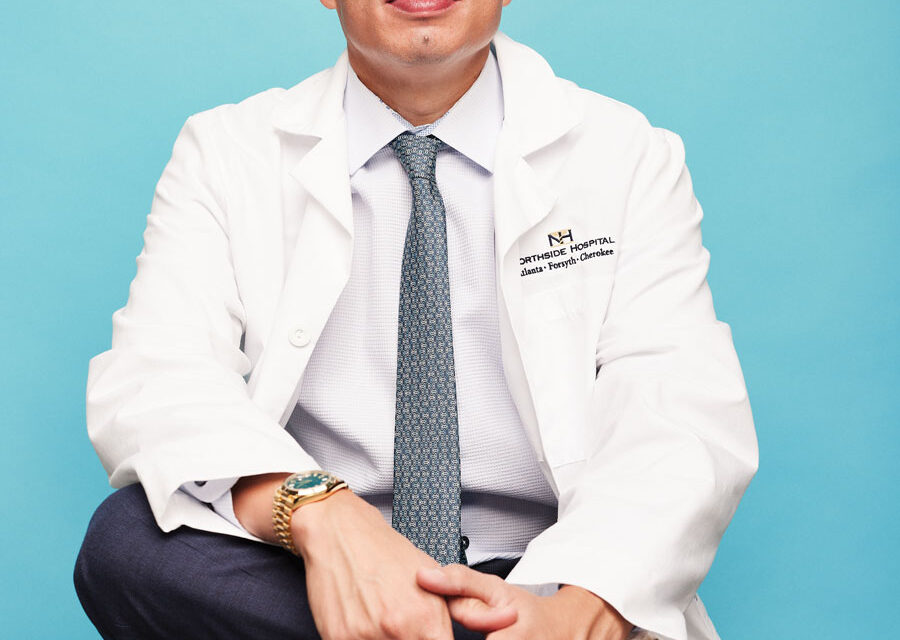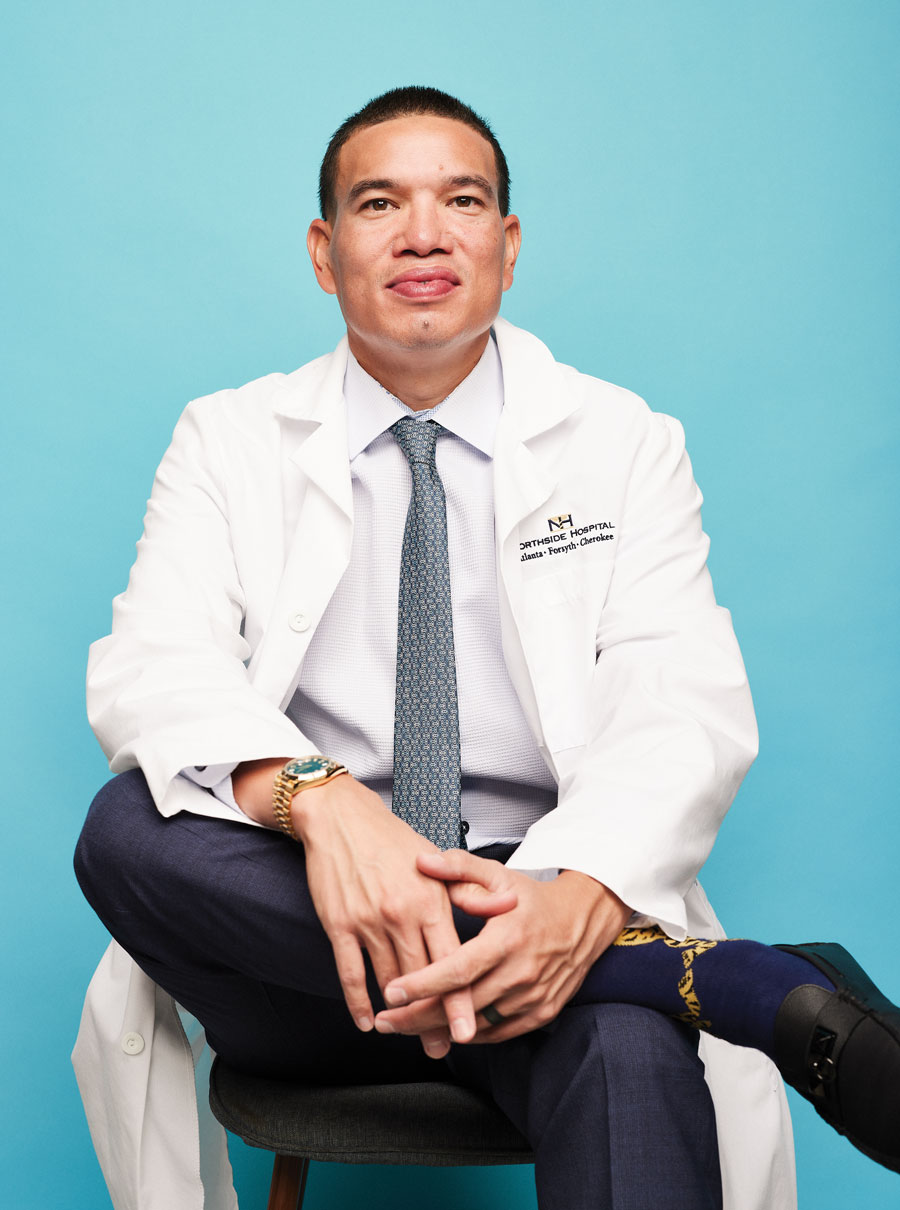
Photograph by Ben Rollins
David Chin Yee, MD
Vitreoretinal specialist
Georgia Retina; section chief, Ophthalmology, Northside Hospital
I grew up in Jamaica, where I had a science teacher who volunteered at a home for the blind. There, I had the experience of helping individuals shave, reading to them, and helping to organize their wallets. They’re so trusting, but they have no other choice. I could see the burden on people who are visually impaired, and I wanted to figure out a way to help people avoid becoming this dependent on others.
During my medical training [to become a retinal specialist], I patched one eye to see what it would be like over a week, doing my daily tasks. You can do it, but it’s rather difficult. There are many people who, unfortunately, for whatever reason, lose sight and we can’t fix it. There are some things we just cannot repair. So the idea is to try to preserve vision, to keep people from getting to that point of no return.
My specialty deals with the two leading causes of irreversible blindness: diabetes in people of working age and macular degeneration, which is the main cause of irreversible blindness in individuals above 60. In my training, I saw an elderly gentleman with diabetes who hadn’t had insurance and was not taking care of himself. His diabetes progressed and led to bleeding or hemorrhaging in both eyes. Finally, he was able to get Medicaid, and he came to our fellowship clinic, where we set up a vitrectomy, a procedure to remove the vitreous hemorrhage. For the first time, he was able to see his newborn grandson.
Within the past two years, I have been the first in Georgia to implement two new treatment options that were recently FDA-approved. One was for wet macular degeneration—the first implantable device for sustained drug delivery to the eye. Then earlier this year, I was able to provide patients with the first FDA-approved treatment for the dry form of macular degeneration with geographic atrophy.
Unfortunately, on a somewhat daily basis, there are still patients that we don’t have treatments for. They still end up being in that situation where they’re vulnerable and have to rely on so many people. Definitely, we’ve made a difference. But I cannot focus completely on the successes because there’s still work to be done.
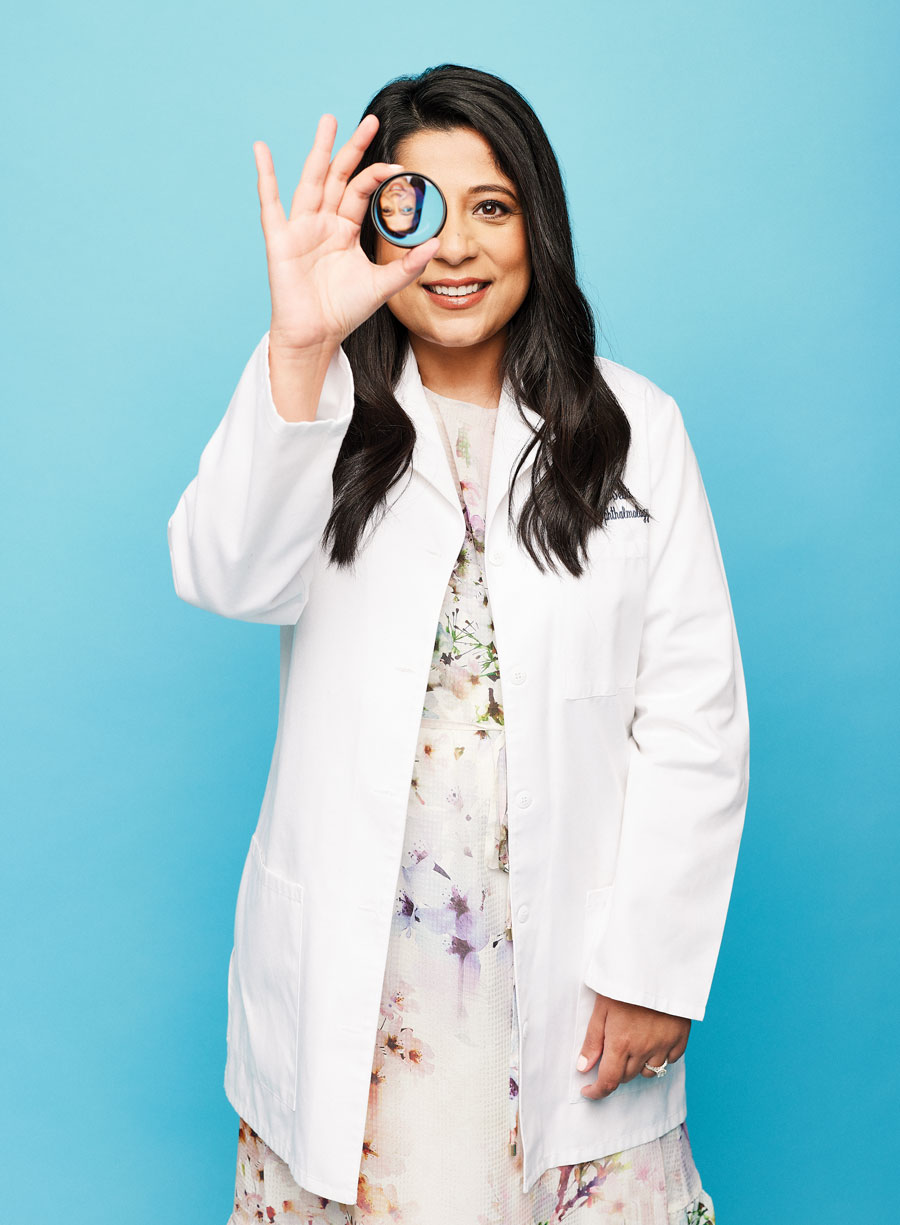
Photograph by Ben Rollins
Shivani Sethi, MD
Pediatric ophthalmologist
Eye Consultants of Atlanta
Five years ago, one mom came into my office with her six-month-old baby, who had developed shaking eye movements called nystagmus. We see these cases all the time, but I found that the daughter’s eyes shaking was her way of showing us that she wasn’t seeing well and that her brain was not developing normal vision. Dense, muddy-colored cataracts covered her pupils and prevented any light from coming into her eyes and reaching her brain. I performed an urgent intraocular surgery to get her vision restored as soon as possible.
Today, that child is five, and she walks into my office with big pink glasses and a ballerina tutu for regular checkups. Her vision continues to develop, and it’s a crazy feeling to hear her say, “I see you, Dr. Sethi,” when I knew she was going to be blind if we didn’t catch her cataracts. She now tells her mom that she wants to be an eye doctor. It reminds me of my first pediatric ophthalmologist, Dr. Pollard, who had no idea that the little girl he gave glasses to was going to walk around pretending to be him. He changed my world when I could finally read the board at school. I even made business cards to give to my eight-year-old classmates that said, “Call me Dr. Sethi. The Pediatric Ophthalmologist.” It sounds really cheesy, but I’ve always wanted to do what I do.
There are fewer than 20 pediatric ophthalmologists left in the state to serve a large population of children who need our help to see. That means I’m busy, but I find it even more rewarding to work with children throughout my day. I’ve never met a pediatric ophthalmologist who isn’t happy doing their job. Every single day we help tiny babies see and experience the world. It just doesn’t get old to see these tiny people I work with see something for the first time and their face lights up. You have small hands high-fiving you when a child can first read a chart. A mom will call to tell me that her baby with glasses recognizes her now.
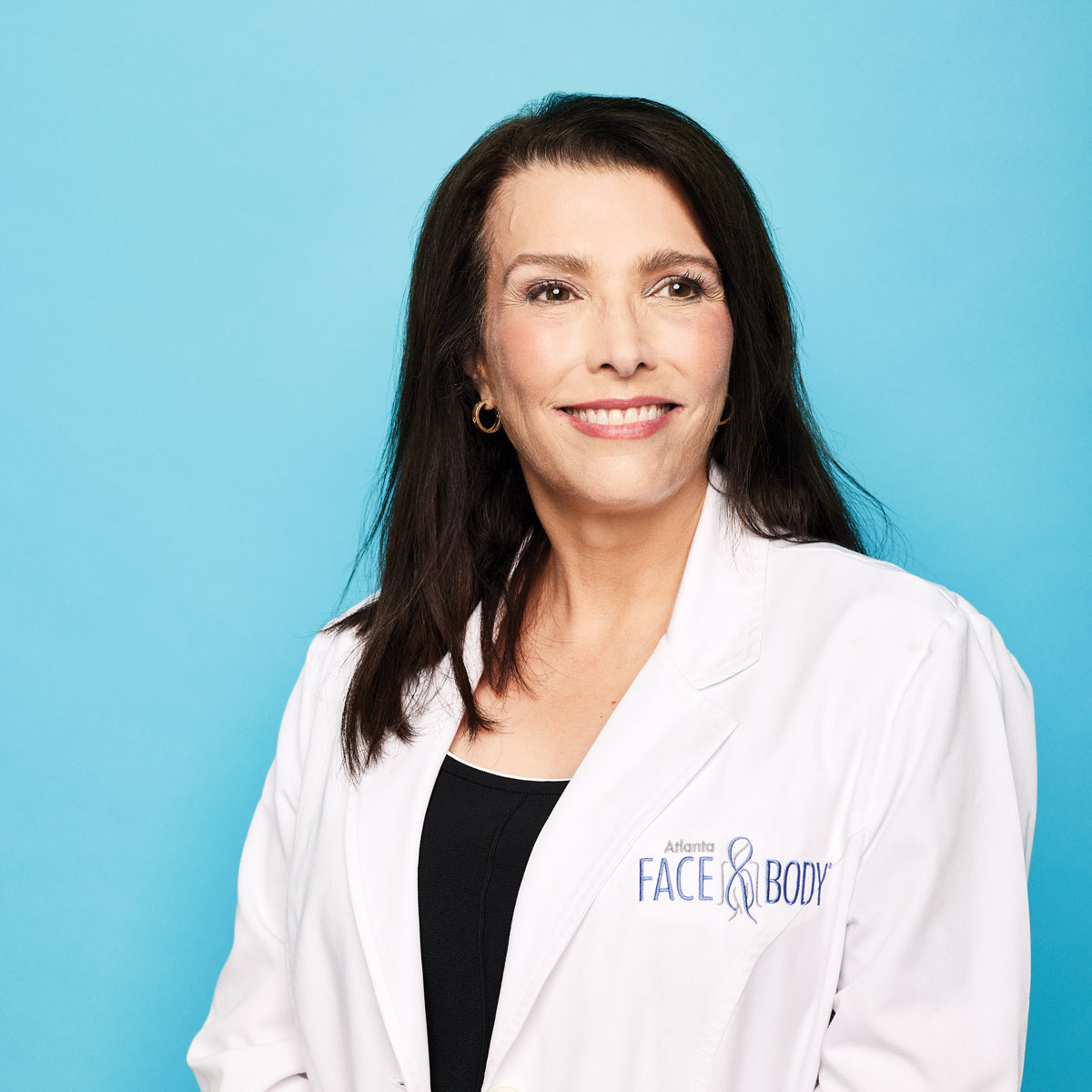
Photograph by Ben Rollins
Elizabeth Whitaker, MD
Plastic surgeon
Atlanta Face & Body
When I was in residency, a patient came in who had immigrated from Sierra Leone. His only complaint was that his face looked different than it used to, and this was very distressing to him. He had been treated by several other doctors, primarily with steroids to reduce the inflammation in his face. The steroids would work briefly, but then his changed appearance would come back.
There was nothing dramatically unusual about his appearance, but he brought in an older picture of himself. On reviewing it, I could see that his midfacial features were slightly different. We ordered a CT scan that showed some abnormal soft tissue thickening in his midface but no other underlying abnormalities. I performed a biopsy, and he had a fungal infection endemic to Africa that was treatable with an antifungal.
This case highlighted two things for me: the importance of our appearance to our emotional well-being, and really listening to your patients. They know their bodies better than anyone, and when they feel something is not right, you need to be very attentive to that feeling. Among all the procedures I saw in my residency, I selected facial plastic surgery as a specialty in large part because it feeds my artistic and creative side. It is the ultimate fusion of the artistic and technical. The beauty of looking at the underlying anatomy of the face and the ability to restore anatomy that has been lost with time, disease, or trauma drew me to my specialty.
Cosmetic procedures are not about vanity for many people. Studies have shown that cosmetic procedures improve quality-of-life scores and lead to reduction in physical, emotional, and social distress.
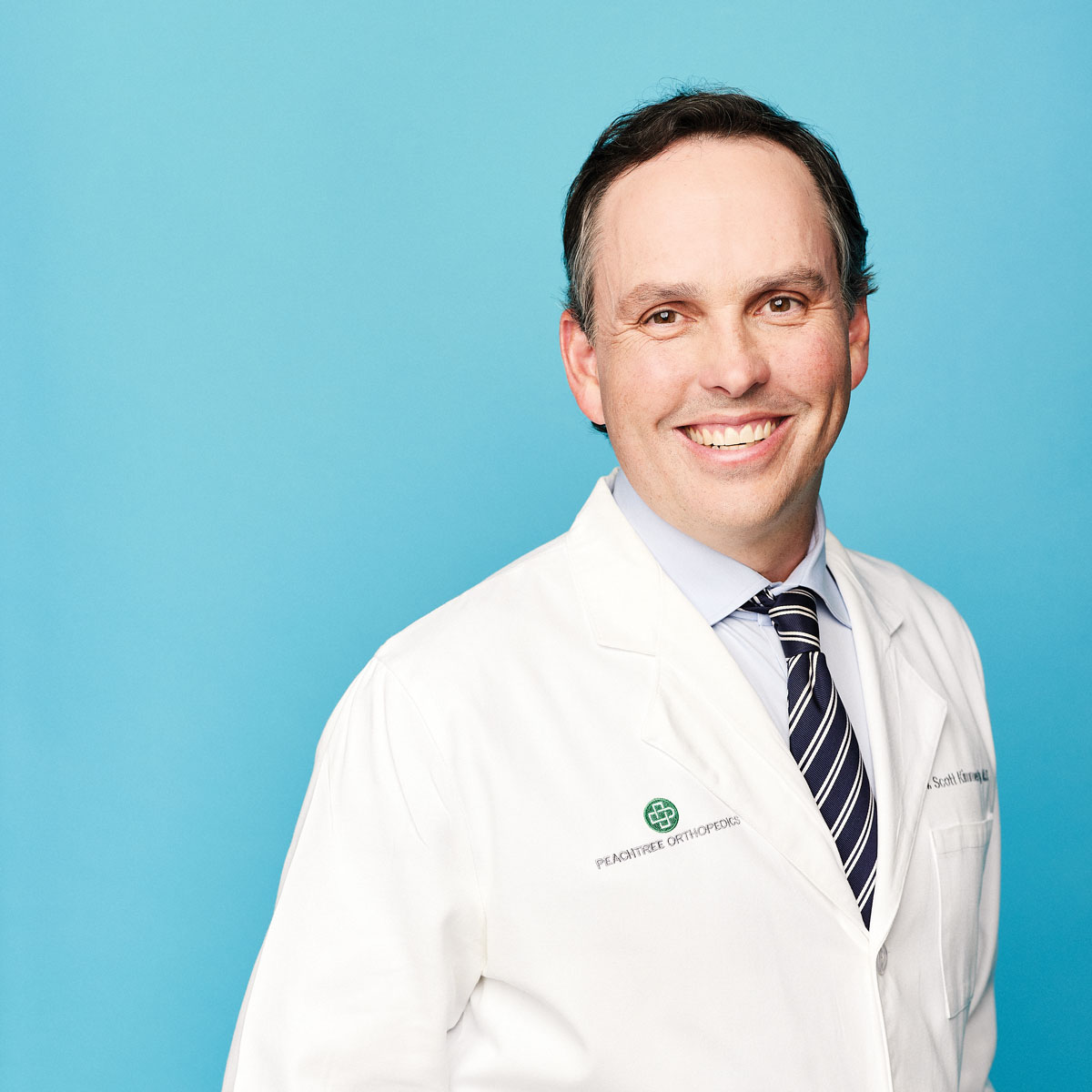
Photograph by Ben Rollins
Scott Kimmerly, MD
Orthopedic surgeon
Peachtree Orthopedics
I received a call that Denton Shamburger, at that time a student at Westminster High School, had suffered an open ankle fracture that went through the skin and allowed the ankle joint to dislocate. The complexity of the break added layers of concern—about returning the bone back into the joint while also preventing possible infection with an open injury. I had to make my first difficult decision of many by choosing to clean the wound and give antibiotics time to prevent infection rather than performing immediate surgery.
Denton’s injury [later] required two surgeries to put the bone back in and to stabilize the ankle with plates and screws. I got to know Denton and his family well through our time together, and I learned of his intense desire to play college football and get back onto the field. Denton lost his sophomore year to the pandemic and suffered this nearly career-ending injury as a junior. As an orthopedic surgeon, I often feel an athlete’s motivation, sometimes even desperation, to get back out there. It requires transparency and sitting down with an athlete to tell them to take it slow, so they can progress as fast as possible.
Denton showed great patience in his recovery and overcame an infection six weeks after his surgery. He needed a semipermanent IV in his arm to receive antibiotics daily. As he rehabilitated, we discussed in my office, at nights, and even on weekends the decision of when to get him back on the field. Denton was able to return for his senior year, and Will Muschamp, the co–defensive coordinator and safeties coach at UGA, saw his game film. The program took a chance on Denton, who is now a sophomore living his dream of playing college football. I got to watch Denton make a tackle at the UGA spring game, and I reflected on the long path that we all traveled to get to that point. He is one of the hardest workers I have ever seen, and I take great pride in the opportunity to support his dream through our work together.
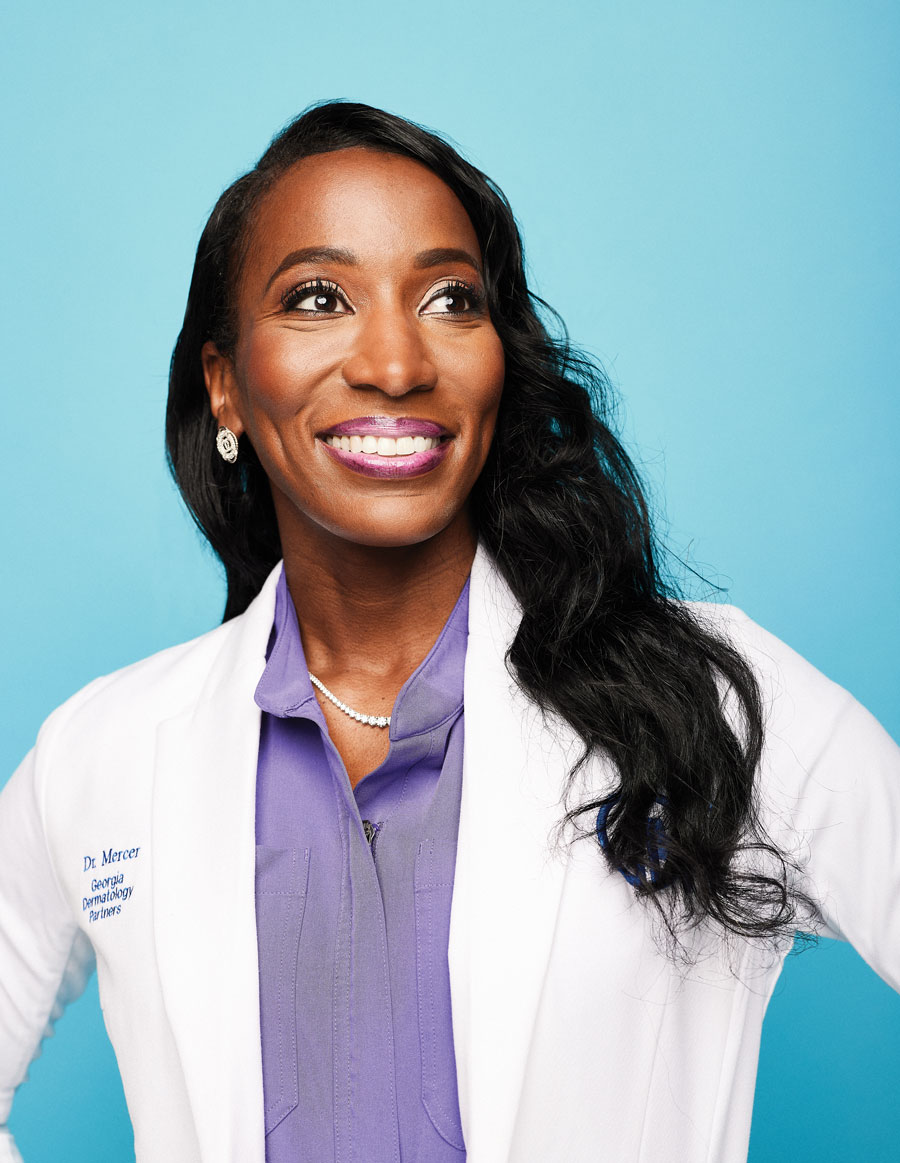
Photograph by Ben Rollins
Jessica Mercer, MD
Dermatologist/dermatopathologist
Georgia Dermatology Partners
As a dermatologist, I have the privilege of being entrusted with the care of patients’ outward experience. While others cannot openly see our cholesterol values or blood pressure readings, issues of the skin are visible to those around us. Thus, when I can effectively treat the rash that may be limiting a patient’s closeness with their partner, the acne that makes one want to skip an event, or the alopecia that may be causing ridicule by peers, I can profoundly impact the well-being of my patients. The ability to make patients feel radiant in their own skin is the most gratifying and rewarding aspect of my field.
Also, skin cancer is the most common cancer in the United States and one of the most preventable. Diagnosis can be made early given the visibility of most types on the skin. For example, I had a 26-year-old Black male patient with a very dark band on his left index finger. It covered almost 80 percent of his nail, and it was jet black. It was one of the most alarming nails that I have seen in my career. We don’t see skin cancer very often in patients of color, but when we do, the most common locations are the palms, soles, and dark streaks in the nails.
It was a tag-team effort with one of my partners. The patient did not want to believe it was anything. His parents had convinced him to come. We wanted to take a nail biopsy. However, one of the challenges of a nail biopsy is that it can forever affect the way that a nail grows. He initially refused. The biggest challenge for him is he is a professional golfer. His hand is integral to his work. I always tell patients, I am your adviser in this process, but ultimately you are the decision-maker for your body. But with this kid, I said, “You have to do this. I will call your mama. We want to save your career, but if you don’t do this, it is potentially life-threatening.” [Through the biopsy] he was diagnosed with melanoma in situ. In most instances, we amputate part of the finger, but I reached out to a nail surgery specialist, and the patient flew to Rhode Island to have surgery. Although the patient doesn’t have a nail plate, we were able to save his finger.
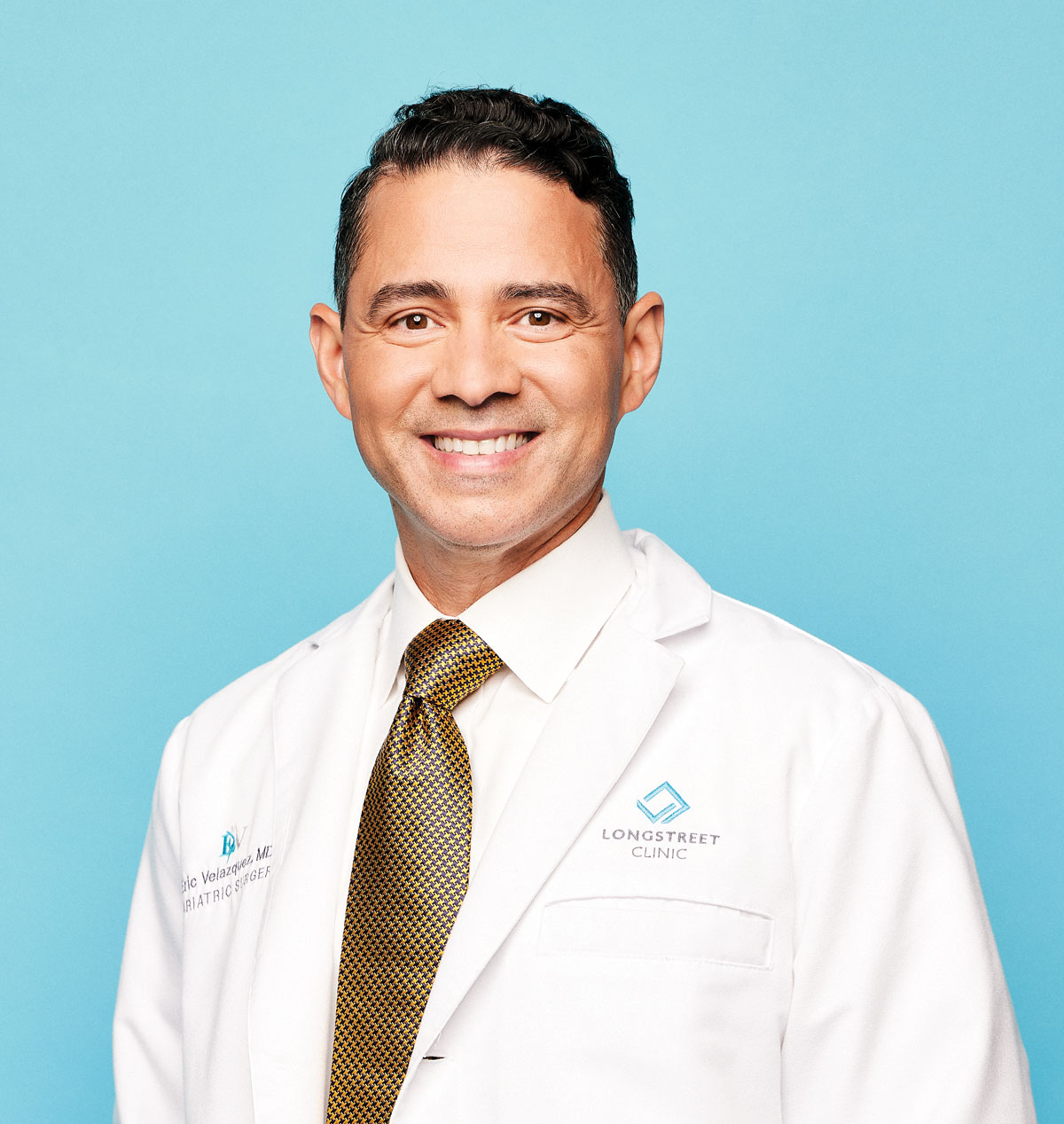
Photograph by Ben Rollins
Eric Velazquez, MD
Bariatric surgeon
Longstreet Clinic Center for Weight Management
During my rotations in residency training as a general surgeon, which included trauma surgery, I saw that while we were successfully saving patients’ lives, many people still weren’t returned to full health. For example, some patients with a hernia repair still had chronic pain, and patients who recovered from a serious accident never regained their previous quality of life.
When I rotated into the bariatric service, I had just a basic knowledge of obesity surgery: Patients are overweight, you reduce the size of the stomach, they lose weight. But then I learned that it is so much more than that.
I remember being in the office with my mentor in bariatric surgery and seeing a spectrum of interactions with patients: a new patient at their full weight, seeking information; a patient just a few weeks past surgery; a patient five years beyond surgery. One patient told me, “When I first came, I was 130 pounds bigger, and I was taking three medications for diabetes and medicine for high cholesterol and high blood pressure.” Then she explained how her life had changed. She wasn’t on medicine anymore. She had gotten married.
It was captivating for me to see the long-term relationship that developed between the patients and the surgeon, as patients returned for follow-up. “As a surgeon, you get to be part of those milestones that patients achieve once they become healthier,” my mentor said. That for me was the turning point and really made me want to pursue this as a specialty.
It’s important to realize that bariatric surgery is not solely focused on weight loss but also on improving metabolic health. Bariatric surgery induces a series of metabolic changes—it alters the brain-gut axis and the production of incretins, hormones that play a critical role in glucose metabolism.
I have had so many success stories. The impact of bariatric surgery goes beyond just the physical changes that patients experience. Successful weight loss can improve a patient’s self-esteem, mental health, and overall quality of life. As a bariatric surgeon, there’s nothing more rewarding than witnessing these positive changes in my patients and knowing that I played a role in helping them achieve a healthier, happier life.

Photograph by Ben Rollins
Walkitria Smith, MD
Family medicine physician
Cofounder, ChastainMD; chief digital medical officer, Morehouse Health, and assistant professor, Morehouse School of Medicine
My mother was diagnosed with breast cancer at 26, shortly after I was born. At that time, the majority of her primary care was being done through her ob-gyn. She had a postpartum follow-up that led to the diagnosis. She constantly reminds us that she’s so blessed that she’s been alive this long. So, from that standpoint, I’ve always known I wanted to be a physician. My goal was to go into family medicine because I wanted to be that touch point, to have the ability to change someone’s life like my mother’s life was changed.
Because of my background, when a woman tells me that there’s a history of breast cancer in her family, that triggers me to go down a path and get even more history. I had a patient in her 30s who had a very significant history with her mother and other family members. African American women tend to have an overall lower occurrence of breast cancer, but we tend not to get diagnosed as quickly and we tend to have breast cancer that happens at a younger age. Through the early testing, we found out she had it. We got her plugged into a team to figure out her next steps. I’m grateful that I have that lens. Being able to save that one life allowed me to feel some sense of gratification for what I experienced personally.
In my practice, I look at digital dashboards and see, “We have this number of patients whose diabetes is uncontrolled, this many have blood pressure uncontrolled. What should we be doing to change that?” Remote monitoring of chronic conditions allows us to intervene earlier so that we can keep them better managed between visits.
I also love that my specialty allows me to develop relationships over years. I’ve taken care of someone’s newborn baby, the mom, and then their mother. Family medicine is like creating a beautiful multigenerational mosaic composed of the various family trees and attributes. Our painting is that knowledge, those conversations, that information from not only one person, but a whole lineage of people.
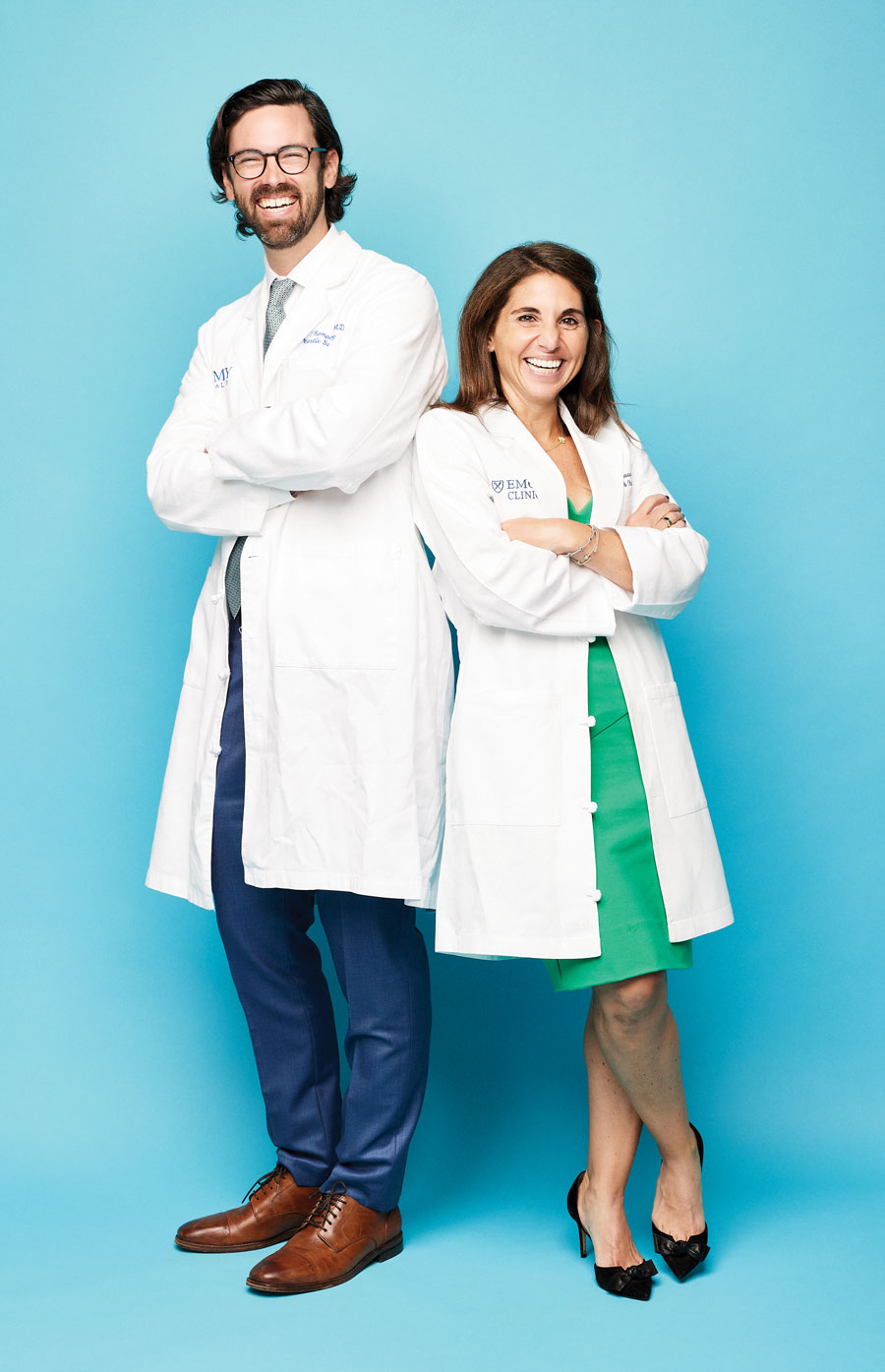
Photograph by Ben Rollins
Jennifer Kawwass, MD
Reproductive endocrinologist
Medical director and division director, Emory Reproductive Center
and her spouse
Peter Thompson, MD
Plastic/reconstructive surgeon
Emory Healthcare
Kawwass When I turned 40, I got my first screening mammogram, and it came back that I needed further follow-up. For whatever reason, I had a premonition that something bad was going to happen. My repeat imaging was bad enough that they did an ultrasound and a biopsy the same day. While I was in Utah giving a talk about work-life balance to [reproductive endocrinology] fellows, I got the results from the biopsy, and it was cancer. Long story short, I had a bilateral mastectomy in December [2021], chemo in January through early April, and then proton therapy radiation for five weeks.
As a fertility physician, I see a lot of young breast cancer patients who have not completed their family-building; they’re sent to me to talk about the impact of chemo on fertility and the options for egg or embryo freezing. My experiences as a breast cancer patient made me even more passionate about the importance of fertility preservation counseling in patients of reproductive age who require treatments, such as chemotherapy, that will impact their future fertility potential. I often think how lucky I am to have completed my family before my breast cancer diagnosis.
Thompson My practice involves a lot of breast reconstruction, and probably 80 percent to 90 percent of my patients have some type of cancer diagnosis. When you see patients with this problem every day, you’re guilty of insulating yourself a little bit from their emotional distress, because you’re just trying to get through your day. When [my wife’s illness] happened, that wall was completely torn down—I know exactly what they are feeling. It really intensified the interactions that I had with patients with breast cancer.
People ask, “If I were your sister, your mother, or your wife, what would you recommend for me?” Now, I can tell them exactly. I try to be even more of a sympathetic ear, more of an advocate for them to make the experience as smooth as possible.
Kawwass I had no family history [or risk factors for breast cancer]. It reminded me that no matter what you do, you have limited control, so you should live in the moment. I’m definitely a worrier and a planner, but I’m doing my best to live in the present.
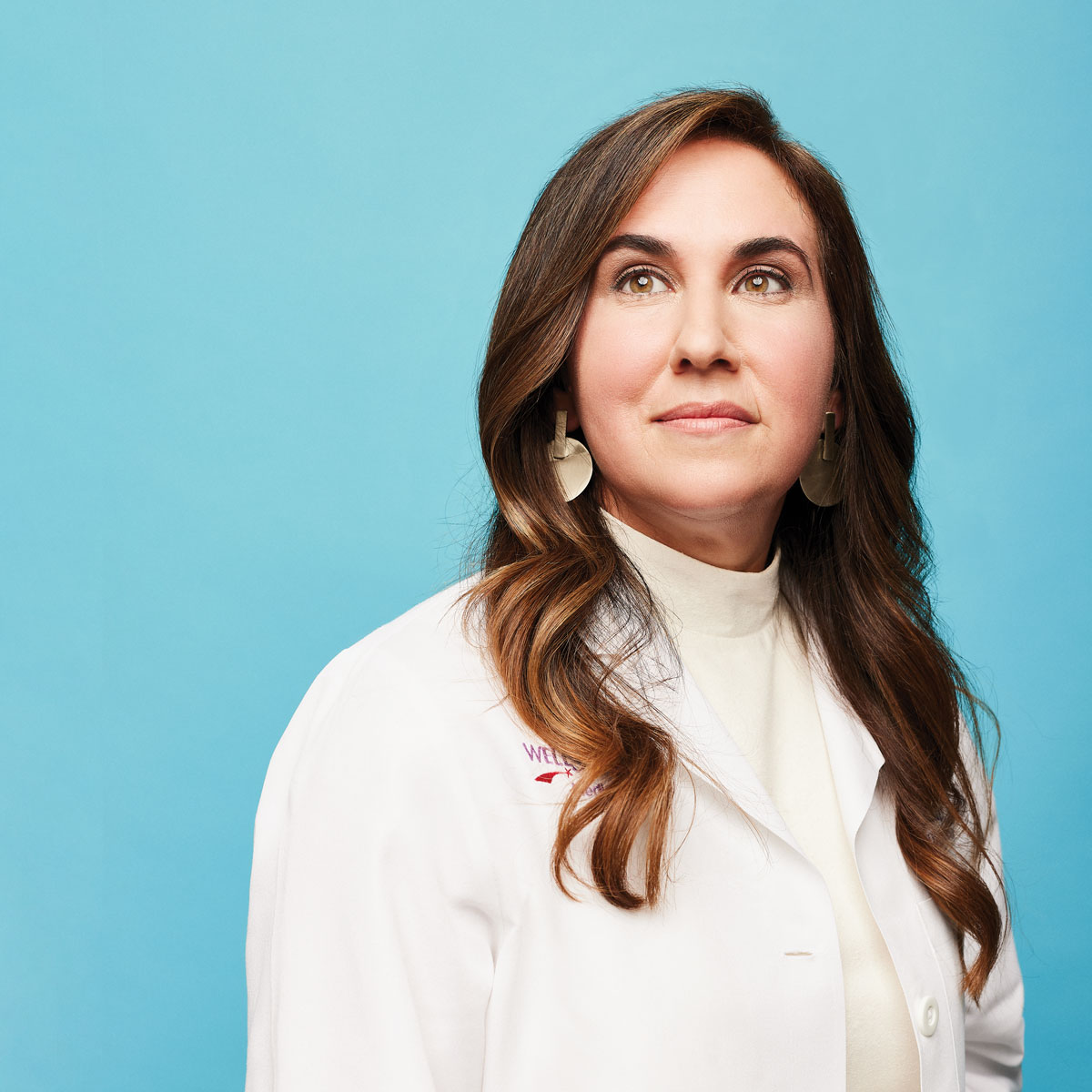
Photograph by Ben Rollins
Deborah Karp, MD
Urogynecologist
Wellstar Urogynecology
Urogynecology only became an official subspecialty of gynecology about 10 years ago. Urologists often concentrate on male issues like prostate problems. Ob-gyns tend to focus on pregnancy and birth control. The issues my subspecialty focuses on, such as pelvic organ prolapse, bladder problems, or other damage to the pelvic floor—which are very common long-term effects of childbearing—are often ignored. These are normal parts of aging, and treatment is often covered by insurance. As urogynecologists, we can change and improve women’s lives with sometimes simple (and at times more complex) procedures and treatments. It is a gratifying subspecialty because we can offer solutions to women who have been suffering for years and didn’t know there were treatments.
Honestly, sometimes the most challenging part of urogynecology is to convince our patients to focus on themselves in order to get the care they need and deserve. As women, we become accustomed to putting others first—our families, our work, etc. Many women live with bladder and pelvic disorders for years and even decades before seeking care. Sometimes these problems become very advanced, which can make them more challenging to treat. However, we can almost always find treatments that allow women to lead more active lives.
The pelvic organs (bladder, bowels, uterus, etc.) all influence and affect each other. As urogynecologists, we use treatments from different specialties such as gynecology, urology, colorectal surgery, gastroenterology, and physical medicine and rehabilitation. Sometimes surgery repairs the function of the organs, but we also rely on medications, physical therapy, or other procedures.
Women often don’t think to get treatment because they are taking care of others. But they get to a point where they literally can’t live with it any longer because they can’t exercise or leave their house. I’ve had patients going through 30 pads a day. Our patients are so happy because they’ve been living with these conditions for years.
Bhrenik P. Shah, MD
Vascular and interventional radiologist
Southwest Atlanta Vascular Care
Rather than a major surgery such as a hysterectomy, I perform uterine fibroid embolization, a minimally invasive, same-day outpatient procedure that can eradicate fibroids and allow women to regain the quality of life they deserve. I want to make sure women know about these options. The results of uterine fibroid embolization are profound. Some women can’t even leave their house when they’re on their menstrual cycle. Some women have to bring extra clothes everywhere; some of them cannot even get up and move because of how bad their anemia is. If fibroids are pressing on their bladders, some patients have to go to the restroom every hour. And as soon as the fibroids shrink after the procedure—it’s just such a huge improvement in lifestyle. A lot of women are embarrassed to talk about it because sexual intercourse can be very painful, and that can be solved. All with a procedure that leaves you with a scar so small that most people can’t even find it a couple of days after the procedure.
David Palay, MD
Ophthalmologist
Atlanta Ophthalmology Associates
A member of the Ranger corps who stormed the beach in Normandy on D-Day, 97-year-old patient “RB” had tragically lost his vision in his right eye due to macular degeneration. As he aged, a cataract in his left, “good” eye nearly robbed him of all his sight. Because he put off surgery on his left eye, the cataract became so dense that other surgeons were afraid that removing it would be too risky. When I met him and his loving family, I was captivated by his heroism and desire to return to a normal life. The cataract was too dense to remove by modern techniques. I reverted to an older method of opening the entire eye and removing the cataract in one large piece, rather than breaking it apart in the eye as we do today. Although risky, the surgery, fortunately, was successful. His vision returned to 20/30, enabling him to read and watch television.
Studies have shown that the fear of going blind often exceeds the fear of premature death. In my field, it is important to understand that fear and anxiety accompany serious eye disease and eye surgery. One of the most important parts of this is establishing a connection with the patient in a way that you can reduce their anxiety and fear. It begins by listening to what the patient has to say and never being rushed. Conveying empathy for the condition. Being honest in explaining risks, but at the same time showing confidence in the ability to fix the problem. It is always a fine balance. As surgeons, we invade patients’ bodies with our instruments. It is an enormous responsibility. There is no doubt in my mind that the better job I do at allaying a patient’s anxiety, the better the results of surgery.
Leah Macklin, DO
Primary care physician
Family Practice Center P.C.
As a diplomate in lifestyle medicine, I talk to every patient about lifestyle. This is a new board certification that started in the last five years. Most doctors are not trained in nutrition. Our specialty addresses the six pillars of a healthy lifestyle: nutrition and diet, physical activity, sleep, stress management, avoidance of risky substances, and connectivity between these issues. As an osteopathic physician (we participate in the same training programs as medical doctors, with additional studies in joint manipulation techniques), I already had a more holistic approach. As a primary care provider, I often feel as though I am expected to be a walking version of Google. Patients come for one thing, then pick my brain about a relative’s rare genetic condition or even a TikTok trend. The latest one seems to be some rumor about parasites. Sometimes I have to cross-reference social media with my medical journals. But I love being kept on my toes, and actually find it makes me a better doctor. Primary care is all about individualizing care. I meet each patient where they are now. I have even learned medical Spanish, as it is so important to speak to patients in their own language and at their own level.
Edward Dourron, MD
Fertility specialist
Medical Director, Pathways Fertility
It is a privilege to help families grow. I am currently treating a 39-year-old patient who had to have a hysterectomy at the time of her cesarean section at Northside Hospital Atlanta when she had her first child, a daughter, in January 2020. She had a condition called placenta accreta that can result in severe hemorrhage at the time of delivery and often requires a hysterectomy to be performed as a lifesaving procedure. She came to Pathways Fertility to undergo in vitro fertilization with the use of a gestational surrogate to carry her baby. She underwent minimal stimulation IVF, which employs lower doses of oral and injectable drugs at about half the cost of conventional IVF. The treatment produced 19 mature eggs that yielded five genetically normal embryos, which will provide them the opportunity to grow their family.
David Rosenfeld, MD
Anesthesiologist (subspecialty in interventional pain management/chronic pain management)
Alliance Spine and Pain Centers
I am mindful of the comorbidity of pain and depression. I think the two really go hand in hand. Two-thirds or more of my chronic pain patients probably have had or are at risk for depression. If I just treat the source of the pain with an injection or an opioid analgesic, and I overlook the depression, I’m still going to have a patient who continues to have pain. Chronic pain management is much more than just medication. The treatments I offer continue to expand every year and include sacroiliac joint fusions, lumbar decompression, and minimally invasive lumbar fusions. Over the last couple of years, I’ve made a number of referrals to bariatric surgeons and to nutritionists to address weight issues. And there are other complementary and alternative-care things. I believe in the use of chiropractors. I refer patients for yoga and other alternative ways to treat their chronic pain.
Leena Lake, MD
Anesthesiologist
Northeast Georgia Physician’s Group Interventional Pain Medicine
A patient in her 60s was referred to me for a workup of low- back pain. In our field, we do our best to find out the etiology of the pain and not just treat symptoms. Along the way of finding out why she was having pain, I uncovered cancer in her spine, which is unusual but does happen. Some doctors shy away from giving this kind of diagnosis, but in a way, I preferred delivering the news because I knew her better than any of her other physicians. It was tough, and we cried, but in the end, she was grateful to have an answer. Most people think my specialty is about being a “pill pusher,” or we get blamed for the opioid crisis in this country. Actually, we use opioids judiciously and pride ourselves on nonopioid management of chronic pain through physical therapy, aquatic exercise, and other methods.
Darwin Brown, MD
Endocrinologist
Diabetes and Endocrinology Associates, Decatur and Conyers
At a certain point during your medical training, you decide whether you want to treat acute problems or be a part of a marathon, developing a long-term relationship with patients. Endocrinology allows you to treat molecular problems in a broad patient population over many years, which I find particularly rewarding. I am about to start my 25th year in practice. I am proud to say that the patient in the first exam room I entered in June 1999 is still someone I see every four months. It’s a really wonderful part of what I do each day.
Matthew Carmichael, MD
Otolaryngology/head and neck surgeon
Northeast Atlanta ENT & Allergy
ENT physicians are intimately involved with the human experience. We deal with the senses—the ears, the nose, taste. And our senses are how we perceive the world. While this is an amazing and humbling aspect of our specialty, it also results in difficult discussions with patients when loss of these senses occurs. When Covid hit, it opened up Pandora’s box. Now a lot of people see how those losses can profoundly change the way you experience the world.
Asaf Yalif, MD
Cosmetic and reconstructive plastic surgeon
Y Plastic Surgery
Plastic surgery touches on almost every surgical specialty, in one way or another. Plastic surgery is a much older specialty than people think, initially focusing on how to heal wounds and close all manner of defects. This includes posttraumatic defects as well as congenital issues, like cleft lip and palate repair. Both of these are plastic surgery. Cancer care is also plastic surgery, from creating a breast after mastectomy to limb salvage and hand and upper-extremity reconstruction. Plastic surgeons helped to create the field of microsurgery, allowing us to move skin, muscles, tissue, and bones from one area of the body to another to help re-create form and function. Everybody likes to look better, but we’re also able to help in ways that most people don’t think of as typical plastic surgery.
Rutledge Forney, MD
Dermatologist
Dermatology Affiliates
The thing I love about my specialty is people can see the problem, and they’re motivated to do something about it. I don’t have to take an X-ray to see it, I don’t have to do a blood test or an EKG. I can walk into a room, and 95 percent of the time, I can look at the problem and try to figure it out. Dermatology has the leading edge on Botox, fillers, lipo—all those things started in the dermatology space. Within dermatology, there is both science and art, and a lot of it is motivated by people not liking the way they look. That’s always motivated us as a profession to look not only at solving medical problems but also at enhancing people’s looks. That’s part of the art of dermatology.
Kelly Weselman, MD
Rheumatologist
Wellstar Rheumatology
One thing many people don’t understand about rheumatology is that we don’t rely on one particular test to make a diagnosis. It’s often a combination of symptoms, physical findings, and lab results that come together like pieces of a puzzle. What I love most about my specialty is the detective work involved in diagnosing and treating these diseases. It’s rewarding to help patients get back to doing things they enjoy, even if they thought it was no longer possible with their condition. I have had young-adult patients think their career track was no longer achievable. Helping them live a good life with a rheumatic disease is wonderful. However, it is challenging that many of our impactful treatments are very expensive and access barriers do exist for many patients. Our health system does not make it easy for patients to navigate care.
Mark McLaughlin, MD
Radiation oncologist
Wellstar Radiation Oncology
When I first started in radiation oncology, I had no idea how much of an impact my work could have on someone’s life. This all changed when a patient from London reached out to me after being diagnosed with recurrent breast cancer and given only months to live. She had come across one of my research studies and contacted me about coming to Atlanta to have treatment. I was able to treat her using CyberKnife radiosurgery, a radiation technique that was brand-new to the Atlanta area at the time. Eighteen years later, she’s still alive and has been present at both of her daughters’ weddings and sends me yearly Christmas cards. I’m proud to have played a part in changing her life and the lives of her loved ones with my specialty. One of the most painful conversations I have is with patients whose cancer is too advanced and who have limited treatment options. What many people may not realize, though, is how quickly the field is progressing with research and treatment methods.
This article appears in our July 2023 issue.
Advertisement

